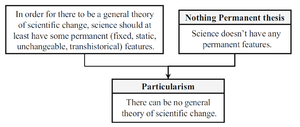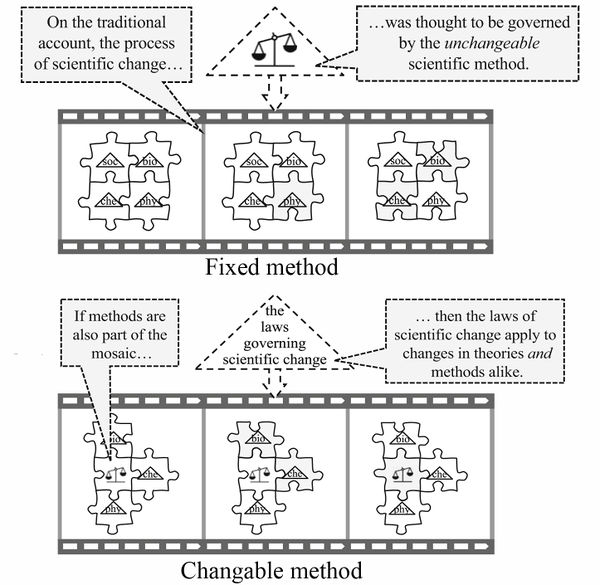Possibility of Scientonomy - The Argument from Nothing Permanent
How can scientonomy be possible if there are no permanent features of science?
The Argument from Nothing Permanent can be summarized as follows: (1) In order for there to be a general theory of scientific change, science should at least have some permanent (fixed, static, unchangeable, transhistorical) features. (2) The Nothing Permanent thesis: Science doesn't have any permanent features. (Conclusion) Particularism: There can be no general theory of scientific change.
If science does not have any permanent features, it seems that any general theory of scientific change will be impossible as there will be no transhistorical regularities of science. So, if the Argument from Nothing Permanent is correct, then the study of scientific change reduces to particularism with no overarching order and science will only be able to be studied in episodes rather than as a whole.
It is important to distinguish between the Argument of Nothing Permanent, The Argument of Changeability of Scientific Method, and The Argument from Social Construction. The Argument of Changeability of Scientific Method argues against the possibility of a general theory of scientific change on the basis that methods are non-permanent, however the Argument from Nothing Permanent not only encompasses methods being transient, but all features of science being transient. What the Argument from Social Construction attempts to say is that there is a certain sociological relativism in science and any permanent features of science are in the social mechanisms that govern the scientific process; i.e. any general theory of scientific change is sociological in nature. The Argument from Nothing Permanent on the other hand excludes there being permanent sociological features in science as well and thus the Argument from Social Construction is a possible response to the Argument from Nothing Permanent.
In the scientonomic context, this question was first formulated by Hakob Barseghyan in 2015. The question is currently accepted as a legitimate topic for discussion by Scientonomy community.
In Scientonomy, the accepted answers to the question can be summarized as follows:
- If there were indeed nothing permanent in science, then scientonomy would be impossible, however, scientonomy posits only that there are regularities in the process of scientific change.
- Scientonomy is possible because the process of scientific change exhibits lawful general regularities.
Contents
Scientonomic History
Acceptance Record
| Community | Accepted From | Acceptance Indicators | Still Accepted | Accepted Until | Rejection Indicators |
|---|---|---|---|---|---|
| Scientonomy | 1 January 2016 | This is when the community accepted its first answer to the question, Response to the Argument from Nothing Permanent (Barseghyan-2015), which indicates that the question is itself legitimate. | Yes |
All Theories
| Theory | Formulation | Formulated In |
|---|---|---|
| Response to the Argument from Nothing Permanent (Barseghyan-2015) | If there were indeed nothing permanent in science, then scientonomy would be impossible, however, scientonomy posits only that there are regularities in the process of scientific change. | 2015 |
If an answer to this question is missing, please click here to add it.
Accepted Theories
| Community | Theory | Accepted From | Accepted Until |
|---|---|---|---|
| Scientonomy | Response to the Argument from Nothing Permanent (Barseghyan-2015) | 1 January 2016 |
Suggested Modifications
Current View
In Scientonomy, the accepted answers to the question are Response to the Argument from Nothing Permanent (Barseghyan-2015) and Possibility of Scientonomy (Barseghyan-2015).
Response to the Argument from Nothing Permanent (Barseghyan-2015) states: "If there were indeed nothing permanent in science, then scientonomy would be impossible, however, scientonomy posits only that there are regularities in the process of scientific change."
Although both the theories and methods of science have changed over history and differ across disciplines, the nothing permanent thesis is denied. Instead, the fixed and stable features of science can take the form of dynamics or laws that govern changes in science through a piecemeal approach. A theory of scientific change is possible by positing laws that describe transitions in science and its constituent elements.
Although it is generally accepted that there seems to be no static transhistorical properties of science, this does not deny the possibility of laws governing the process of scientific change in a piecemeal fashion. Theories have, of course, proven themselves to be changeable. Methods of practicing and theory appraising have also proven to be changeable. The aims, goals and philosophies behind what science ought to be have also clearly changed. However, although a case can be made for these static properties of science to be non-permanent, perhaps the fundamental mechanism governing how these properties change can be permanent. Hence, the absence of static properties in science fails to show the impossibility of a general theory of scientific change.
There is the possibility of a mechanism of scientific change that governs the changes in theories, methods and other elements of science.
Possibility of Scientonomy
Possibility of Scientonomy (Barseghyan-2015) states: "Scientonomy is possible because the process of scientific change exhibits lawful general regularities."
Related Topics
This question is a subquestion of Possibility of Scientonomy.
This topic is also related to the following topic(s):
References
- ^ Laudan, Larry. (1996) Beyond Positivism and Relativism. Theory, Method, and Evidence. Westview Press.
- ^ Feyerabend, Paul. (1975) Against Method. New Left Books.
- ^ Galison, Peter. (2008) Ten Problems in History and Philosophy of Science. Isis, 111-124.
- ^ Barnes, Barry and Bloor, David. (1982) Relativism, Rationalism and the Sociology of Knowledge. In Hollis and Lukes (Eds.) (1982), 21-47.
- ^ Bunge, Mario. (1999) Social Science Under Debate. University of Toronto Press.
- ^ Weinberg, Steven. (2003) Facing up: Science and its cultural adversaries. Harvard University Press.

